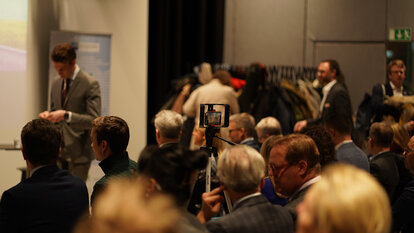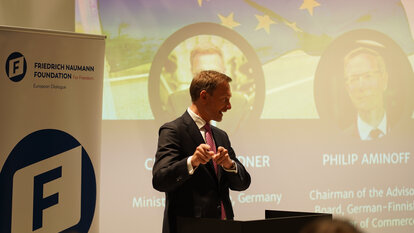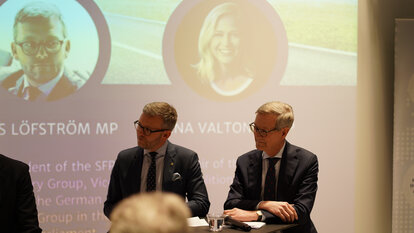Economy
Press Release: Key Experts Discuss the Future of Europe’s Economy

Included in the panel moderate by Janica Ylikarjula were: Christian Lindner, Elina Valtonen MP, Mats Löfström MP, Philip Aminoff.
© fnfeuropeOn the 15th February 2023, Friedrich Naumann Foundation European Dialogue with the German-Finnish Chamber of Commerce co-organized a panel discussion on the future of Europe’s economy. The event brought together key experts and policymakers to discuss the challenges and opportunities facing the European economy and how to move from polycrisis to polyopportunities.
The event began with a welcome speech by Dr. Jan Feller, managing director of the German-Finnish Chamber of Commerce, emphasizing the importance of the future of the European economy for Germany and Finland, which are important trading partners. He also stressed the need to transition from poly-crisis to poly-opportunities, which is already visible in the German-Finnish business.
Christian Lindner, Germany’s Minister of Finance, delivered the keynote speech, highlighting the profound changes and challenges facing Europe’s economy. He emphasized the need to put energies together to boost growth and make Europe a global player. Lindner highlighted three key aspects: encouraging businesses and investment, putting public finances on a better footing, and building better external ties.
The panel discussion, moderated by Janica Ylikarjula, Vice President International Affairs and Policy at VTT Technical Research Centre of Finland, focused on how to prioritize measures to make Europe’s economy future-proof. The panelists included Christian Lindner, Minister of Finance, Germany, Elina Valtonen MP, Vice Chair of the National Coalition Party, Mats Löfström MP, Vice President of the SFP Parliamentary Group, Vice-Chair of the German Friendship Group in the Finnish Parliament, and Philip Aminoff, Chairman of the Advisory Board, German-Finnish Chamber of Commerce.
Valtonen emphasized the need for more flexibility in the fiscal and growth pact and more market discipline, promoting more competitiveness and social and ecological market economy while sticking to the liberal world trade order. Löfström highlighted the need to establish a European joint picture on the global level and be more agile and quicker to react, increase resilience and less dependence on certain continents and energy supplies, and manage public debt levels to maintain the sovereignty of finances. Aminoff emphasized the massive amounts of investments required due to the twin transition and the need for self-sufficiency and digitalization.
The event highlighted the importance of prioritizing measures to make Europe’s economy future-proof, transitioning from polycrisis to polyopportunities and the need for increased competitiveness, market discipline, resilience, and investments. The Friedrich Naumann Foundation European Dialogue aims to continue fostering discussions and collaboration to enhance the future of the European economy.

With full attendance the event was concluded successfully in Helsinki on the 15th of Feb 23
© @fnfeurope
Minister of Finance (Germany) Christian Lindner making his keynote speech

Mats Löfström MP, Vice President of the SFP Parliamentary Group, Vice-Chair of the German Friendship Group in the Finnish Parliament, and Philip Aminoff, Chairman of the Advisory Board, German-Finnish Chamber of Commerce
© @fnfeurope